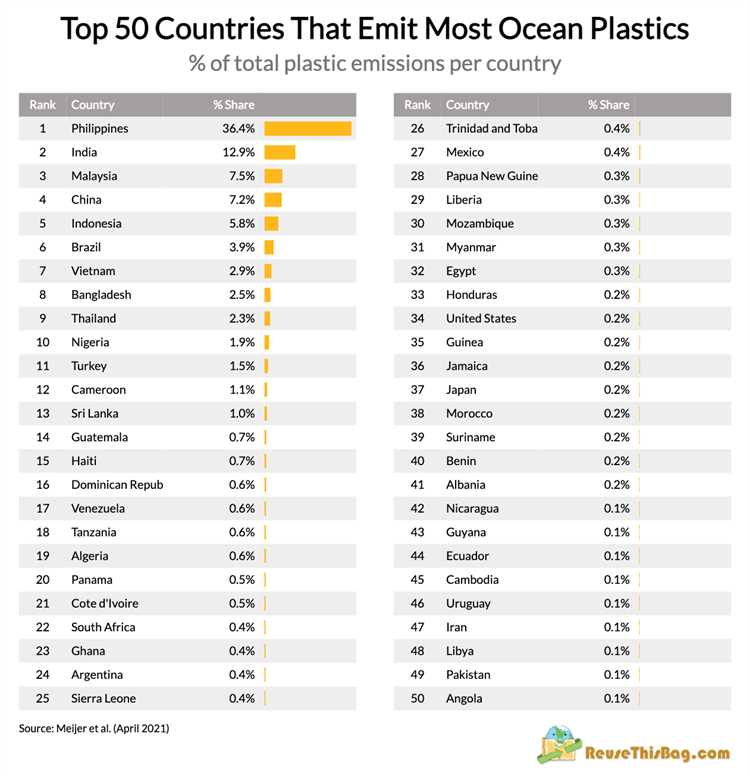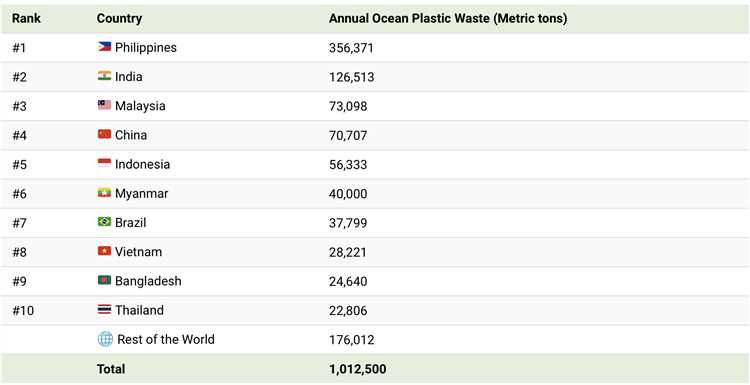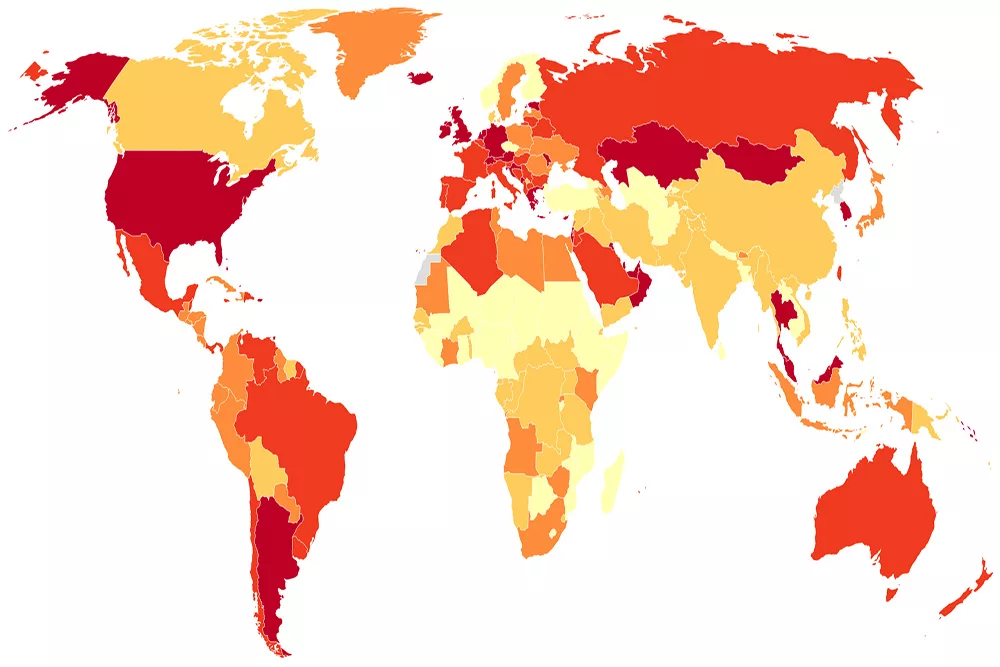
In recent years, plastic waste has become a major environmental concern worldwide. It is estimated that over 8 million tons of plastic waste end up in the oceans each year, posing a serious threat to marine life and ecosystems. Europe, being one of the largest producers and consumers of plastic products, plays a significant role in this global issue.
Among European countries, some stand out for their high levels of plastic waste production. These countries not only generate significant amounts of plastic waste but also face challenges in managing and recycling it effectively. Understanding the top European countries with the highest plastic waste production is crucial in developing strategies to mitigate the environmental impact of plastic waste.
One such country is Germany, which is known for its industrial prowess and high level of consumption. With a population of over 83 million people, Germany produces a staggering amount of plastic waste. Despite having an efficient recycling system in place, a significant amount of plastic waste still ends up in landfills or as litter.
Another European country with a major plastic waste production issue is the United Kingdom. With a population of over 66 million people, the UK generates a substantial amount of plastic waste that poses significant challenges for waste management. Efforts are being made to reduce plastic consumption and improve recycling rates, but more needs to be done to address this pressing issue.
- Norway – Leader in Plastic Waste
- Plastic Waste Generation in Norway
- Factors Contributing to Plastic Waste
- Norway’s Efforts to Combat Plastic Waste
- Conclusion
- Germany – Second Highest Plastic Waste Producer
- United Kingdom’s Plastic Waste Crisis
- France’s Struggle with Plastic Waste
- Italy – One of the Biggest Plastic Polluters in Europe
- Plastic Waste Generation
- Contributing Factors
- Efforts Towards Plastic Waste Management
- Spain – Battling Plastic Waste Problems
- Collaboration with European Union
- Local Community Efforts
- Q&A:
- What are the top European countries with highest plastic waste production?
- How much plastic waste does Germany produce?
- Are there any measures in place to reduce plastic waste production in Europe?
- What are the environmental consequences of high plastic waste production?
- How can individuals contribute to reducing plastic waste production in their daily lives?
Norway – Leader in Plastic Waste
Norway might be known for its stunning fjords and pristine landscapes, but it is also a leader when it comes to plastic waste production. Despite its image as an environmentally conscious country, Norway faces a significant plastic waste challenge.
Plastic Waste Generation in Norway
According to recent data, Norway produces a staggering amount of plastic waste each year. In fact, it is estimated that Norway generates over X million tons of plastic waste annually. This puts Norway at the top of the list in terms of plastic waste production in Europe.
Factors Contributing to Plastic Waste
Several factors contribute to Norway’s high plastic waste production. One major factor is the country’s reliance on single-use plastics, which are used extensively in sectors such as food packaging and beverage containers. These single-use plastics often end up in landfills or as litter, contributing to the growing plastic waste problem.
In addition, Norway’s extensive fishing industry also contributes to plastic waste. Fishing gear, such as nets and lines, are often made from plastic materials and can end up in the ocean, posing a threat to marine life and ecosystems.
Norway’s Efforts to Combat Plastic Waste
Despite its plastic waste challenge, Norway is taking steps to address the issue. The country has implemented various initiatives to reduce plastic waste and promote recycling. For instance, Norway has implemented a bottle deposit system, where consumers receive a refund for returning plastic bottles. This has led to increased recycling rates and reduced plastic waste from beverage containers.
Norway is also investing in innovative technologies to tackle plastic waste. The country is supporting research and development of new materials that are more sustainable and can replace single-use plastics.
Furthermore, Norway is actively participating in international efforts to combat plastic pollution. The country has endorsed the United Nations’ Clean Seas campaign, which aims to reduce marine litter and promote sustainable waste management practices.
Conclusion
While Norway may be a leader in plastic waste production, it is also taking significant steps to address the issue. Through initiatives like a bottle deposit system and investment in innovative technologies, Norway is working towards reducing plastic waste and promoting a more sustainable future.
Germany – Second Highest Plastic Waste Producer

Germany is one of the leading countries when it comes to plastic waste production in Europe. With its strong manufacturing industry and high consumption rate, it produces a significant amount of plastic waste each year.
In 2019, Germany generated approximately X million metric tons of plastic waste, making it the second highest plastic waste producer in Europe. The country’s plastic waste production has been steadily increasing over the years due to various factors such as population growth, industrial development, and consumer habits.
One of the major contributors to Germany’s plastic waste production is its packaging industry. The country produces a large amount of plastic packaging materials for various sectors, including food and beverages, cosmetics, and electronics. These single-use plastic products contribute to the overall plastic waste generation in the country.
Germany has taken steps to address its plastic waste issue and promote sustainable practices. The government has implemented recycling programs and initiatives to reduce plastic consumption. The country also encourages the use of reusable bags and containers, as well as the proper sorting and disposal of plastic waste.
However, despite these efforts, Germany still faces challenges in managing its plastic waste. The country heavily relies on incineration and landfilling for plastic waste disposal, which have negative environmental impacts. This highlights the need for further improvements in waste management infrastructure and the promotion of circular economy principles.
Overall, Germany plays a significant role in plastic waste production in Europe and continues to work towards finding sustainable solutions to reduce its plastic waste footprint.
United Kingdom’s Plastic Waste Crisis

The United Kingdom is facing a severe plastic waste crisis, with a staggering amount of plastic waste being produced every year. Plastic pollution has become a major environmental concern in the country, as it is causing significant harm to the ecosystem and wildlife.
One of the main contributors to this crisis is the excessive use of single-use plastics. Items like plastic bags, bottles, and packaging are discarded after a single use, leading to a massive accumulation of plastic waste. This not only creates visual pollution but also poses a serious threat to marine life.
The United Kingdom has made efforts to address this crisis through various initiatives. The government has introduced a plastic bag charge, encouraging people to use reusable bags instead. Additionally, there have been campaigns promoting the use of alternatives to single-use plastics, such as biodegradable materials.
However, despite these efforts, the problem persists. The recycling rates for plastic waste in the United Kingdom are still relatively low, leading to a significant amount of plastic being sent to landfill or ending up in the environment. This lack of proper waste management infrastructure exacerbates the plastic waste crisis.
Furthermore, the United Kingdom has been exporting a considerable amount of plastic waste to other countries for recycling. While this may seem like a solution, it often leads to environmental issues in the receiving countries, as they may not have the capacity or resources to handle the influx of plastic waste.
It is crucial for the United Kingdom to intensify its efforts in tackling the plastic waste crisis. This includes implementing stricter regulations on the use of single-use plastics, investing in advanced recycling technologies, and improving waste management infrastructure. By doing so, the country can move towards a more sustainable future and mitigate the environmental impacts of plastic waste.
France’s Struggle with Plastic Waste
France is among the top European countries struggling with the issue of plastic waste production. Like many other countries, France faces challenges in managing and reducing plastic waste due to its harmful impacts on the environment and marine life.
One of the major concerns in France is the excessive use of single-use plastic items such as plastic bags, straws, and bottles. These items contribute significantly to the country’s plastic waste production and pose a threat to ecosystems, wildlife, and human health.
The French government has taken several steps to combat plastic waste. In July 2016, France became the first country to ban single-use plastic bags in supermarkets. This initiative aimed to reduce the consumption of plastic bags and promote the use of more eco-friendly alternatives like reusable bags.
In addition to the plastic bag ban, France has also implemented a ban on plastic straws, cutlery, and plates starting from 2020. This progressive measure encourages the use of biodegradable or compostable alternatives, reducing the reliance on single-use plastic products.
Furthermore, France has implemented recycling programs to reduce plastic waste. The country has an extensive system for the collection and sorting of plastic waste, urging citizens to recycle their plastic products. France is also actively involved in researching and developing innovative recycling technologies to efficiently manage and process plastic waste.
However, despite these efforts, France still has a long way to go in tackling its plastic waste problem. It requires continuous public awareness campaigns and education on the importance of reducing, reusing, and recycling plastic products. Additionally, effective policies and stricter regulations are necessary to hold businesses accountable for their plastic waste production.
Overall, France acknowledges the severity of the plastic waste issue and is taking steps towards a more sustainable future. By implementing bans, promoting recycling, and raising awareness, France is striving to reduce its plastic waste production and protect the environment for future generations.
Italy – One of the Biggest Plastic Polluters in Europe
Italy, known for its rich culture, delicious cuisine, and stunning landscapes, unfortunately, is also one of the biggest plastic polluters in Europe. The country’s high population density coupled with its strong industrial and manufacturing sector has contributed to its significant plastic waste production.
Plastic Waste Generation
Italy generates a vast amount of plastic waste each year. According to recent statistics, the country produced approximately X million metric tons of plastic waste in [YEAR]. This staggering amount places Italy among the top plastic-waste-generating countries in Europe.
Contributing Factors
Several factors contribute to Italy’s high plastic waste production. Firstly, the country’s population density plays a role. With a population of over 60 million people, there is naturally a higher demand for products and packaging, resulting in increased plastic consumption.
Furthermore, Italy’s robust industrial and manufacturing sectors also contribute to plastic pollution. Many of these industries heavily rely on plastic materials for packaging, transportation, and product manufacturing, leading to a substantial amount of plastic waste being generated throughout the production process.
Efforts Towards Plastic Waste Management
Aware of the environmental impact, Italy has taken steps to address its plastic waste challenge. The country has implemented recycling programs and waste management regulations to encourage proper disposal and recycling of plastic materials.
Additionally, Italy has implemented measures to reduce the use of single-use plastics. Bans on plastic bags and the introduction of reusable alternatives have helped reduce plastic waste in some cities and regions.
However, despite these efforts, more work needs to be done to further reduce plastic pollution in Italy. Education and awareness campaigns on the importance of responsible plastic use and recycling are crucial to change consumer behaviors and ensure a sustainable future.
- Italy’s high population density and strong industrial sector contribute to its significant plastic waste production.
- The country generated X million metric tons of plastic waste in [YEAR], placing it among the top plastic-waste-generating countries in Europe.
- Efforts to address plastic waste include recycling programs, waste management regulations, and reducing the use of single-use plastics.
- Education and awareness campaigns are essential to promote responsible plastic use and recycling.
Spain – Battling Plastic Waste Problems
Spain has been facing a significant challenge in dealing with plastic waste. As one of the top European countries with high plastic waste production, it has been striving to find effective solutions to combat this issue and protect its environment.
One of the key initiatives taken by the Spanish government is the implementation of strict recycling policies. Through education and awareness programs, the public has been encouraged to actively participate in recycling efforts. Spain also promotes the use of reusable bags and containers, reducing the dependency on single-use plastics.
In addition, Spain is investing in innovative technologies to manage and reduce plastic waste. Research and development projects have been launched to find alternative materials and solutions for plastic packaging. Companies are also encouraged to implement sustainable practices and adopt eco-friendly production processes.
Collaboration with European Union
Spain has been collaborating with the European Union in tackling plastic waste issues. The EU’s Plastic Strategy, which aims to make all plastics reusable or recyclable by 2030, aligns with Spain’s goals. Spain actively participates in discussions and shares best practices to promote a circular economy for plastics.
Local Community Efforts
Local communities in Spain are also taking part in the fight against plastic waste. Many organizations and individuals are organizing clean-up campaigns, beach and river plastic collection drives, and awareness events. They aim to raise consciousness about the harmful effects of plastic pollution and motivate people to adopt sustainable practices.
While Spain continues to face plastic waste problems, its determination and efforts to battle this issue are commendable. Through collaborative initiatives and community participation, Spain is working towards creating a more sustainable and plastic-free future.
Q&A:
What are the top European countries with highest plastic waste production?
The top European countries with the highest plastic waste production are Germany, the United Kingdom, and France.
How much plastic waste does Germany produce?
Germany produces a significant amount of plastic waste, making it one of the top countries in Europe. The exact amount of plastic waste produced is not specified in the article.
Are there any measures in place to reduce plastic waste production in Europe?
Yes, there are various measures in place across Europe to reduce plastic waste production. These include plastic bag bans, recycling initiatives, and the implementation of stricter regulations on the use of single-use plastics.
What are the environmental consequences of high plastic waste production?
High plastic waste production has several detrimental environmental consequences. Plastic waste often ends up in oceans and waterways, harming marine life. It also contributes to air and water pollution and takes a significant amount of time to decompose, leading to long-lasting environmental damage.
How can individuals contribute to reducing plastic waste production in their daily lives?
Individuals can contribute to reducing plastic waste production by implementing simple lifestyle changes. These include using reusable bags and water bottles, avoiding single-use plastics, and properly recycling plastic waste.